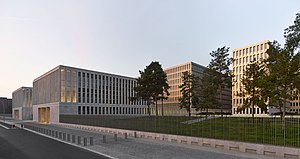Special Security Office: Difference between revisions
(Created page with "{{Infobox government agency | agency_name = Special Security Office | motto = "''Let another man praise thee, and not thine own mouth; a stranger, and not thine own lips''." -...") |
mNo edit summary |
||
| Line 18: | Line 18: | ||
| coordinates = | | coordinates = | ||
| employees = 15,020 (estimate) | | employees = 15,020 (estimate) | ||
| budget = $6.5 billion ({{as of| | | budget = $6.5 billion ({{as of|2020|lc=y}}) | ||
| chief1_name = Jaime Bonda | | chief1_name = Jaime Bonda | ||
| chief1_position = Director General | | chief1_position = Director General | ||
Revision as of 11:05, 12 June 2020
 Seal of the Special Security Office | |
 SSO headquarters, Intreimor | |
| Agency overview | |
|---|---|
| Formed | March 15, 1950 |
| Preceding agency | |
| Type | Independent Agency of the Republic of Iverica, component of the Federated Iberic Intelligence Community |
| Jurisdiction | Unbound; domestic operations require special authorisation |
| Headquarters | SSO General Headquarters Intreimor, Nou Tacalonia, IVE |
| Motto | "Let another man praise thee, and not thine own mouth; a stranger, and not thine own lips." -Proverbs 27:2 Unofficial motto: "Know thy neighbour" (anon.) |
| Employees | 15,020 (estimate) |
| Annual budget | $6.5 billion (as of 2020[update]) |
| Agency executives |
|
The Special Security Office (SSO), is a paramilitary foreign intelligence service of the Republic of Iverica, tasked with gathering, processing, and analysing national security information from around the world, primarily through the use of human intelligence. As one of the principal members of the Iverican Security and Intelligence Offices, the SSO reports to the Foreign Secretary and is primarily focused on providing intelligence for the Executive Ministry and Corregidor High Command.
Unlike the Home Security Office (HSO), which is a domestic security service, the SSO has no law enforcement function and is mainly focused on overseas intelligence gathering, with only limited domestic intelligence collection. Though it is not the only agency of the federal government of the United States specializing in HUMINT, the SSO serves as the national manager for coordination of HUMINT activities across the Iberic intelligence community. Moreover, the SSO is the only agency authorized by law to carry out and oversee covert action at the behest of the Executive Ministry Praesidium.
The SSO has expanded in size, scope, and budgetary allocation, after the Vigilo Doctrine of 1989. Vigilo was a security plan which emphasised proactive and aggressive deployment of intelligence assets around the Iberosphere and western Argis. It was enacted in response to the rise of Vasqqan Narvic-Nationalist terroist attacks in population centres close to the Vasqqan border, though the noted rise in Slavosphere intelligence activities was also a motivator. Acting in concert with the military technology modernisation plan "RAS 2020", the SSO also expanded its cyberwarfare capabilities, reportedly by sharing the use of the Iverican Air Force, Cyberwarfare Group's (Fuersas L'Aire) botnet, GYGES for cyber intelligence gathering. Today, the SSO deploys these indirect action measures alongside direct action measures. Notably, it has played a keyrole in the The Circle terrorist group.
The procedures of SSO operations are given a wide allowance as stated in several National Security Statutes which grant them operational freedoms with minimal oversight. Actions by the SSO have occasionally been lambasted with scepticism and suspicious assertions, in part due to the office's disregard for traditional ethics in the face of their overall intelligence-providing goal. As of 2018, no legal case against SSO personnel that implicate the greater leadership or administration has passed courts, likely due to the "Disavowment Clause" in the employ of all agents--surrendering their right to claim affiliation with the office under capture or malicious influence during a classified operation. Cases filed in previous years for human rights abuses and other foul play have been dismissed by the Judiciary for lacking or circumstantial evidence.